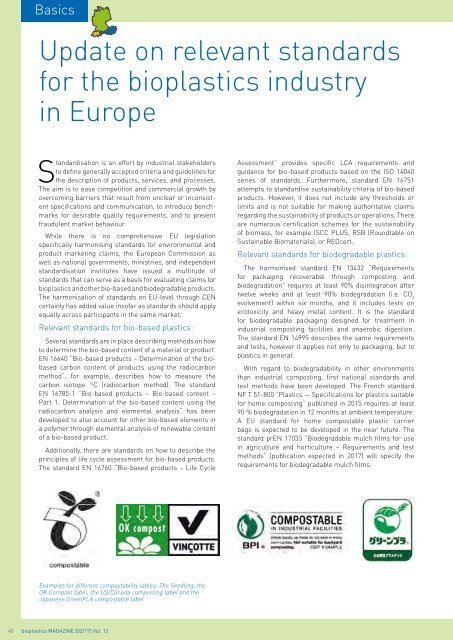Issue 02/2017
bioplasticsMAGAZINE_1702
bioplasticsMAGAZINE_1702
You also want an ePaper? Increase the reach of your titles
YUMPU automatically turns print PDFs into web optimized ePapers that Google loves.
Basics<br />
Update on relevant standards<br />
for the bioplastics industry<br />
in Europe<br />
Standardisation is an effort by industrial stakeholders<br />
to define generally accepted criteria and guidelines for<br />
the description of products, services, and processes.<br />
The aim is to ease competition and commercial growth by<br />
overcoming barriers that result from unclear or inconsistent<br />
specifications and communication, to introduce benchmarks<br />
for desirable quality requirements, and to prevent<br />
fraudulent market behaviour.<br />
While there is no comprehensive EU legislation<br />
specifically harmonising standards for environmental and<br />
product marketing claims, the European Commission as<br />
well as national governments, ministries, and independent<br />
standardisation institutes have issued a multitude of<br />
standards that can serve as a basis for evaluating claims for<br />
bioplastics and other bio-based and biodegradable products.<br />
The harmonisation of standards on EU-level through CEN<br />
certainly has added value insofar as standards should apply<br />
equally across participants in the same market.<br />
Relevant standards for bio-based plastics:<br />
Several standards are in place describing methods on how<br />
to determine the bio-based content of a material or product.<br />
EN 16640 “Bio-based products – Determination of the biobased<br />
carbon content of products using the radiocarbon<br />
method“, for example, describes how to measure the<br />
carbon isotope 14 C (radiocarbon method). The standard<br />
EN 16785-1 “Bio-based products – Bio-based content –<br />
Part 1: Determination of the bio-based content using the<br />
radiocarbon analysis and elemental analysis“ has been<br />
developed to also account for other bio-based elements in<br />
a polymer through elemental analysis of renewable content<br />
of a bio-based product.<br />
Additionally, there are standards on how to describe the<br />
principles of life cycle assessment for bio-based products.<br />
The standard EN 16760 “Bio-based products - Life Cycle<br />
Assessment” provides specific LCA requirements and<br />
guidance for bio-based products based on the ISO 14040<br />
series of standards. Furthermore, standard EN 16751<br />
attempts to standardise sustainability criteria of bio-based<br />
products. However, it does not include any thresholds or<br />
limits and is not suitable for making authoritative claims<br />
regarding the sustainability of products or operations. There<br />
are numerous certification schemes for the sustainability<br />
of biomass, for example ISCC PLUS, RSB (Roundtable on<br />
Sustainable Biomaterials), or REDcert.<br />
Relevant standards for biodegradable plastics:<br />
The harmonised standard EN 13432 “Requirements<br />
for packaging recoverable through composting and<br />
biodegradation” requires at least 90% disintegration after<br />
twelve weeks and at least 90% biodegradation (i.e. CO 2<br />
evolvement) within six months, and it includes tests on<br />
ecotoxicity and heavy metal content. It is the standard<br />
for biodegradable packaging designed for treatment in<br />
industrial composting facilities and anaerobic digestion.<br />
The standard EN 14995 describes the same requirements<br />
and tests, however it applies not only to packaging, but to<br />
plastics in general.<br />
With regard to biodegradability in other environments<br />
than industrial composting, first national standards and<br />
test methods have been developed. The French standard<br />
NF T 51-800 “Plastics — Specifications for plastics suitable<br />
for home composting” published in 2015 requires at least<br />
90 % biodegradation in 12 months at ambient temperature.<br />
A EU standard for home compostable plastic carrier<br />
bags is expected to be developed in the near future. The<br />
standard prEN 17033 “Biodegradable mulch films for use<br />
in agriculture and horticulture – Requirements and test<br />
methods” (publication expected in <strong>2017</strong>) will specify the<br />
requirements for biodegradable mulch films.<br />
Examples for different compostability lables: The Seedling, the<br />
OK Compost label, the US/Canada composting label and the<br />
Japanese GreenPLA compostable label<br />
48 bioplastics MAGAZINE [<strong>02</strong>/17] Vol. 12


















